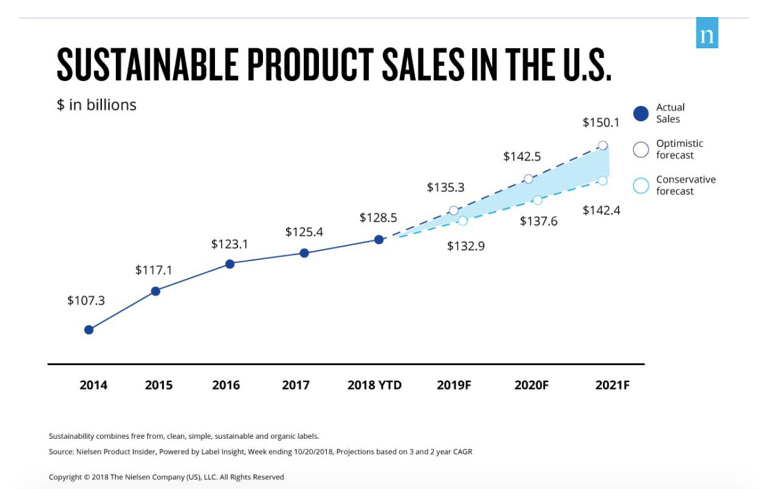Sharing sustainability and eco practices to capture the millennial market
January 21, 2020How highlighting eco and purpose-driven efforts help connect with millennial buyers.
The millennial tsunami isn’t coming, it’s already here. In 2019, the millennial generation surpassed boomers for the first time—not just in sheer numbers, but also in buying power. If you’re a B2B business, millennials are even more influential: By 2020, they’ll make up 50% of the workforce, and 75% by 2030.
Millennials are the most studied generation in history, which is good news for marketers. There’s a wealth of information about their buying habits and what motivates their decisions—and unsurprisingly to anyone who’s been paying attention, sustainability is a primary motivation. Inriver’s research found that 63% would stop using a product if it was detrimental to the environment, and 62% would reconsider their purchase decisions if retailers were more transparent about the environmental impact of delivery.
Nielsen surveyed 30,000 millennial consumers in 60 countries and discovered a whopping 73% are willing to pay more for sustainable products. This is a revolutionary concept for marketers who, since basically the beginning of time, focused on quality and price to move products. Millennials want to buy a lifestyle; they want ethically sourced, sustainable goods that align with their values and purpose. And this desire is universal: Brands entering international markets need to highlight their sustainable credentials and share them proudly.
Lifestyle and supply chains
“Sustainability” to millennials is more than materials, packaging, and supply chains, although those things definitely matter. This generation is socially conscious as they grew up with social media and the internet, and feel responsible to reverse the impact of climate change, income inequality, and diversity challenges. Nearly 80% give their loyalty—and their money—to brands that are committed to making the world a more equitable place.
Last week at the National Retail Federation (#NRF2020) in New York, a panel entitled, “Ethical enlightenment in retail -it’s all about the stakeholders” featured pioneer eco-brand, The Body Shop and socially responsible shoe company, Adelante, as examples of driving purpose in organizations that align brands and buyers.

Millennials care about eco and purpose-driven business. And, they are digital natives and always connected. This means they move seamlessly between devices and channels and expect a consistent, personalized experience wherever they shop. Their digital footprints showcase their commitment to an ethical lifestyle.
Millennials are also extremely health-conscious, which fits with their sustainable value system. Over 80% believe healthy eating is the key to wellness and longevity, and they use their devices to access health information before they make choices. They also prioritize work-life balance and respond favorably to brands that promote mind-body wellness.
Finally, this generation is spiritually aware. They don’t view religion and spirituality equally and favor human rights over traditional religious values. Brands that spark the millennials’ desire for a more equal and inclusive society will gain their trust and loyalty.
Don’t make the mistake of thinking millennials are free with their money once you win them over with your sustainable bona fides, however. They are far more financially savvy than they’re given credit for. Even though—or because—they earn 20% less than their parent’s generation, they prioritize value and saving for the future. They prefer socially responsible investments and nearly 20% of 23- to 37-year-olds have at least $100,000 set aside for retirement. The millennial ethos is buying fewer things of better quality, produced in a socially and environmentally conscious manner.
Capturing the millennial market
How can brands put this knowledge to work for them? It all starts with product information. Our inriver research showed that your product stories matter:
- 31% pay attention to shipping policies
- 27% want to know the materials and packaging information
- 24% look for fair trade policies
- 23% review manufacturing processes
- 17% check out the country of origin
In addition, 74% actively look for environmentally friendly products when they shop—and 53% will drop a preferred brand in favor of one that better aligns with their values. Showcasing your ethics and sustainable policies in your product information is absolutely essential to winning this key demographic.

Remember, millennials are buying a lifestyle. That means simply presenting the information isn’t enough. Consistent messaging and compelling stories, presented in an engaging way across online and offline channels win with these buyers.
Don’t forget the “social” component in social awareness. Millennials look for brands that take positive steps—donating profits and time to charity, for example—to demonstrate their commitment. They use social media to find information about brands and express their own commitment to a cause. Brands that understand the power of social connections stand to win big with millennials.
Ultimately, it all comes down to adaptive merchandising™—understanding what millennial buyers need to know about brands and products at every stage of the path to purchase. A PIM solution helps you create, enrich, and syndicate compelling product stories and deliver those essential eco-details that millennials want to see from the brands they do business with.
Product details on the supply chain, eco-practices, and purpose-driven alignment are more than nice to have in 2020. They are expected. If you invest and believe in these practices, help your buyers find that valuable information easily. Read the case study on Hamelin, a global manufacturing company that proudly shares its sustainability commitment.